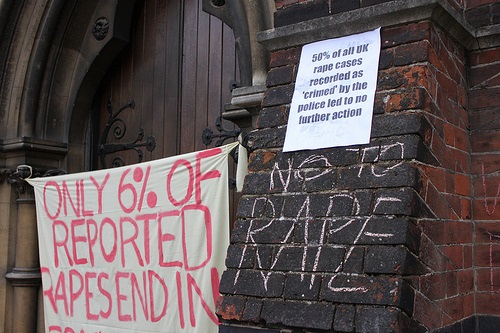
May 9, 2015; New York Times
Rape is one of the few crimes one can think of that could go uninvestigated for years or decades without an uproar. Take the likely hundreds of thousands of victims whose rape kits are currently sitting in storage lockers around the country, collecting dust. How many untested kits are there? No one knows because no one is keeping track. Many, like the Joyful Heart Foundation, New York County district attorney Cyrus R. Vance, Detroit prosecutor Kym Worthy, Houston mayor Annise Parker, and more are helping in an unprecedented effort to end the backlog locally and nationally. Yet in order to fully eradicate the backlog, a worthy and winnable fight, we must understand why there is a backlog to begin with.
Nicholas Kristof wrote a column last week in the New York Times that raised an important point about the rape kit backlog and the economic segregation of American communities. Arguably, rape is a universal crime. However, how that rape is investigated and which victims are disproportionately impacted by inept investigations are invariably influenced by the locales in which the crimes were committed.
In an article for the NYT from last December, Callie Marie Rennison notes that there does not appear to be a comprehensive study of the relationship between socioeconomic conditions and sexual assault prevalence. However, using the current statistics available from the National Crime Victimization Survey from 1992 to 2012, “disadvantaged” women in lower income brackets ages 12 and up are sexually assaulted at higher rates. Women in households with annual incomes of $7,500 or less were 3.7 times more likely to be assaulted than women in households of $35,000 to $49,000.
Likewise, education also plays a role in which demographics are victimized more frequently, education also being a marker of socioeconomic status. Women without a high school diploma are sexually assaulted at a rate 53 percent higher than women who have a high school diploma and more than 400 percent than women with a bachelor’s degree.
And what about police departments in low-income neighborhoods? These communities can have smaller departments. With less money and fewer patrol cars to go around, some cases must be prioritized over others, at least for the time being. The cost of testing rape kits, upwards of $1,500, deters many departments as well, low-income communities or not.
Sign up for our free newsletters
Subscribe to NPQ's newsletters to have our top stories delivered directly to your inbox.
By signing up, you agree to our privacy policy and terms of use, and to receive messages from NPQ and our partners.
Yet these potential reasons can’t completely explain how Detroit could have found 11,341 untested kits, Memphis 12,164, Milwaukee 2,655, Houston 6,650 and 3,783 in Tulsa, as indicated in Kristof’s article. When each of these kits represents a crime, how could it be that all of these crimes have gone uninvestigated? Is it just a lack of resources and funds?
“Primarily it’s raging incompetence that we find too often in police departments that we go into,” said Tom Dart, the sheriff from Cook County, Chicago who found untested kits in Chicago’s neighboring towns, “It’s a combination of raging incompetence and just not caring.”
When the victims are statistically more likely to be low-income, sex workers, or homeless, among other labels, we must question what part apathy is playing in the testing (or non-testing) of rape kits.
“There is no doubt that we have often been lackadaisical about addressing sexual assault,” says Kristof. “The injustice of rape is compounded by the injustice of official indifference.”
Unfortunately, any apathy that officials may or may not have felt when these decades-old backlogs began is residual today.
“Part of the reason rape kits aren’t tested is because rape isn’t taken seriously,” Natasha Alexenko, founder of Natasha’s Justice Project and rape survivor, said to the Daily Beast. “There’s not enough of us willing to come forward and say, we were sexually assaulted. It’s time to get rid of the stigma.”
And it’s been to police departments’ detriment to not take rape seriously. This new movement to test rape kits has helped identify perpetrators in multiple crimes, not just the one rape for which the kit was created. If we want to end the backlog, we must also start changing the archaic attitude that has contributed to hundreds of thousands of rapes having gone uninvestigated for decades.—Shafaq Hasan











